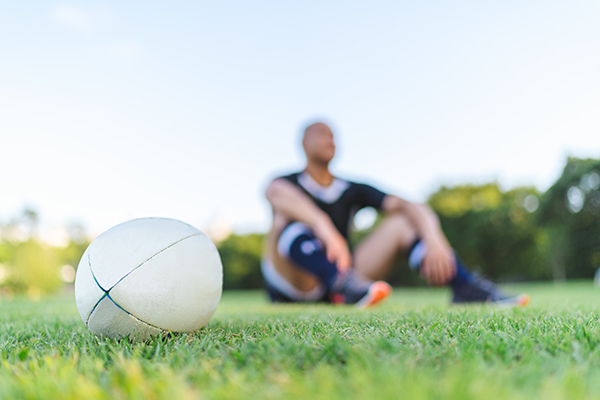HIGH PERFORMANCE
"Sport has the power to change the world. It has the power to inspire, it has the power to unite people in a way that little else does. It speaks to youth in a language they understand. Sport can create hope, where once there was only despair. It is more powerful than governments in breaking down racial barriers. It laughs in the face of all types of discrimination".
Nelson Mandela, Laureus Sport Awards, 25 May 2000. 9
THE ROLE OF SPORT
INVESTMENT IN HIGH PERFORMANCE SPORT
 Government
Government
CHALLENGES
High performance sport, and in particular Australia’s Olympic, Paralympic, and Commonwealth Games athletes and teams, continue to enjoy support from the majority of Australians.
However, with an increasingly fractured media, broadcasting and content landscape, and a growing number of options for entertainment and physical activities there is a risk that Australians may move away from valuing sport to the same degree.
High performance sport, especially international competitions, are also more likely to be impacted by global events such as increased geo-political tensions, war, terrorism, disease outbreaks, and climate change.21
Sport in Australia will need to focus on continuing to provide high quality sporting experiences for players, fans, volunteers, and the broader community, with integrity and inclusion being key factors in maintaining people’s engagement.
- AusPlay Focus: Australians’ participation in Summer Olympic and Paralympic sports, Australian Sports Commission, (May 2021)
- AusPlay Focus: Community participation in Commonwealth Games sports, Australian Sports Commission, (July 2022).
- Community Perceptions Monitor Annual Report 2023-2024, Australian Sports Commission, (August 2024)
- Intergenerational review of Australian sport, BCG Consulting for the Australian Sports Commission, (2017)
- Happiness, pride and elite sporting success: What population segments gain most from national athletic achievements? Kirstin Hallmann, Christoph Breuer, Benedikt Kühnreich, Sport Management Review, Volume 16(2), pp.226-235, (May 2013)
- The trickle-down effect: what population groups benefit from hosting major sports events? Pamela Wicker and Popi Sotiriadou, International Journal of Event Management Research, Volume 8(2), (2013)
- The inspirational effects of three major sport events, Girish Ramchandani and Richard Coleman, International Journal of Event and Festival Management, Volume 3(3), pp.257-271, (2012)
- Correlates of pride in the performance success of United States athletes competing on an international stage, Bryan Denham, International Review for the Sociology of Sport, Volume 45(4), (2010)
- Nelson Mandela: ‘Sport has the power to change the world’, Laureus Lifetime Achievement Award, 25 May 2000, Monaco, France, Speakola, (accessed 24 November 2022).
- Creating sport participation from sport events: making it happen, Laurence Chalip, B. Christine Green, Marijke Taks, et al., International Journal of Sport Policy and Politics, Volume 9(2), pp.257-276, (2017).
- Long-term impact of the Tokyo 1964 Olympic Games on sport participation: A cohort analysis, Kurumi Aizawa, Ji Wu, Yuhei Inoue, et al., Sport Management Review, (26 May 2017).
- Mapping the potential societal impacts triggered by elite sport: a conceptual framework, Jens De Rycke and Veerle De Bosscher, International Journal of Sport Policy and Politics, Volume 11(3), pp.485-502, (2019).
- The Olympic Games and raising sport participation: a systematic review of evidence and an interrogation of policy for a demonstration effect, Weed, Mike; Coren, Esther; Fiore, Jo; et al., European Sport Management Quarterly, Volume 15, Issue 2, (April 2015),
- The value of sport and active recreation to New Zealanders, Angus and Associates for Sport NZ, (May 2017).
- Sports Index: Participation trends 2015, Market Insights and Consumer Analytics for Sport Singapore, (June 2016).
- Delivering sports participation legacies at the grassroots level: The voluntary sports clubs of Glasgow 2014, Macrae E, Journal of Sport Management, Volume 31 (2017).
- Sports Diplomacy 2030, Australian Government, Department of Health, (2019).
- Major Sporting Event Impact and Legacy, Clearinghouse for Sport, (accessed 24 November 2022).
- An update to An India Economic Strategy to 2035: Navigating from potential to delivery, Australian Government, Department of Foreign Affairs and Trade, (2022).
- Sports Diplomacy 2030, Commonwealth of Australia, Department of Health, (2019).
- The Future of Australian Sport: The second report: Megatrends shaping the sport sector over coming decades, Australian Sports Commission (ASC), Commonwealth Scientific and Industrial Research Organisation (CSIRO), (2022).
- Singapore Cycling Federation (SCF) and Australian Cycling Academy (ACA) sign Memorandum of Understanding (MoU) for 2 Years to develop cycling talent, Sports in Cycling, (16 November 2021).
- Olympic sports science—Bibliometric analysis of all summer and winter Olympic sports research, Millet GP, Brocherie F, Burtscher J, Frontiers in Sports and Active Living, 3:772140, (2021)
- Talent Research in Sport 1990–2018: A Scoping Review. Baker J, Wilson S, Johnston K, et al., Frontiers in Psychology, 11:607710, (2020).
- Australia: country cards, Global Observatory for Physical Activity (GoPA), (accessed 6 February 2024).
- AusPlay dataset, Australian Sports Commission, (accessed April 2022).
- Australian Institute of Sport: evidence-based position statements and best practice guidelines, Australian Sports Commission, (accessed 19 December 2022).
- National HP Sport Strategy 2032+, Australian Sports Commission, (accessed 19 December 2022).
- Research hotspots and trends on sports medicine of athletes: A scientometric analysis from 2003 to 2023, Ye Tao, Mastera, Xiongce Lv, Medicine, Volume 102(39), e35254, (September 2023).
- Legacy '23: Women's Football World Cup Post-Tournament Report, Football Australia, (February 2024).
RELATED TOPICS
Discover more about the value and benefits of sport.
Last updated: 29 November 2022
Content disclaimer: See Clearinghouse for Sport disclaimer
IS THIS INFORMATION COMPLETE?
The Clearinghouse for Sport is a sector-wide knowledge sharing initiative, and as such your contributions are encouraged and appreciated. If you would like to suggest a resource, submit a publication, or provide feedback on this topic, please contact us.
Alternatively, if you would like to be kept up to date with research and information published about this topic, please request a research profile setup.







